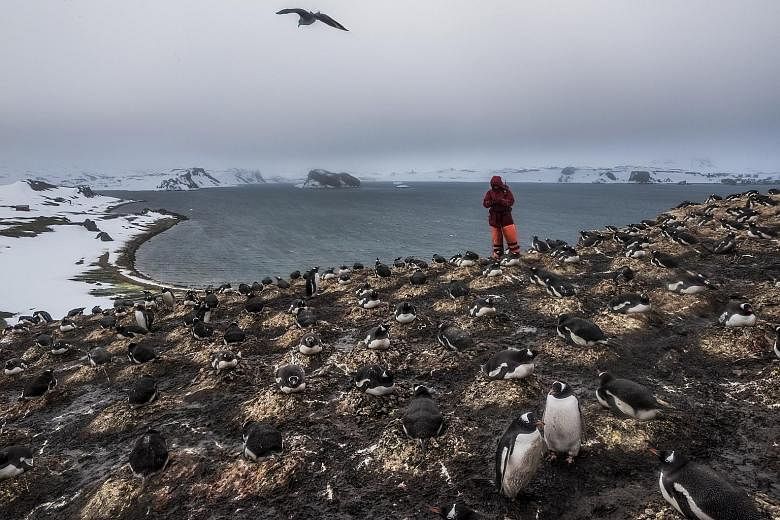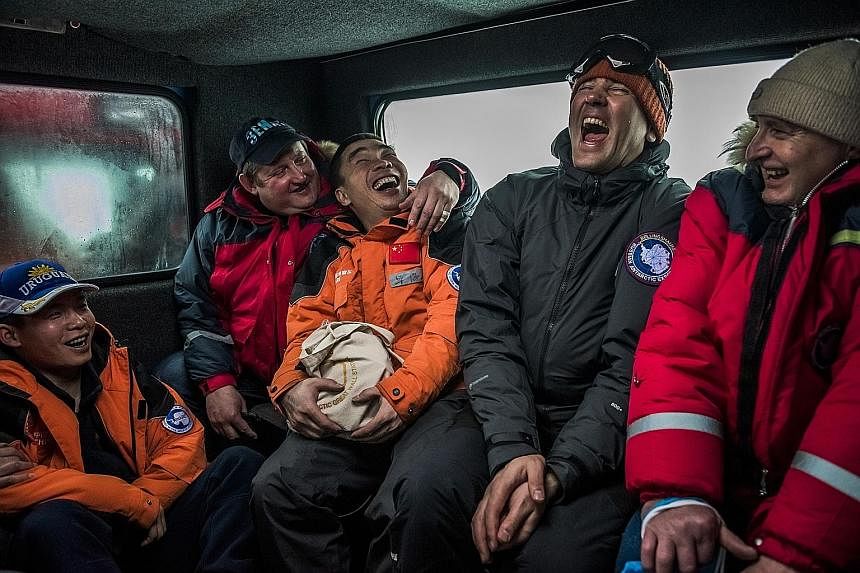BELLINGSHAUSEN STATION (Antarctica) • On a glacier-filled island with fjords and elephant seals, Russia has built Antarctica's first Orthodox church on a hill overlooking its research base, transporting the logs all the way from Siberia.
Less than an hour away by snowmobile, Chinese labourers have updated the Great Wall Station, a linchpin in China's plan to operate five bases on Antarctica, complete with an indoor badminton court, domes to protect satellite stations and sleeping quarters for 150 people.
Not to be outdone, India's futuristic new Bharathi base, built on stilts using 134 interlocking shipping containers, resembles a spaceship. Turkey and Iran have announced plans to build bases too.
More than a century has passed since explorers raced to plant their flags at the bottom of the world, and for decades to come, this continent is supposed to be protected as a scientific preserve.
But an array of countries are rushing to assert greater influence here, with an eye not just towards the day those protective treaties expire, but also for the strategic and commercial opportunities that exist now.
-
BIG PLAYERS AT THE BOTTOM OF THE WORLD
-
Countries around the world are making a beeline for Antarctica, with 70 bases set up by 29 countries already operational on the icy continent. Some countries have a bigger presence than others. Here are the major players with permanent bases:
• CHINA: Four bases, building a fifth
• RUSSIA: Four bases
• CHILE: Four bases
• US: Three bases
• AUSTRALIA: Three bases
-
Antarctica has the cleanest air in the world, allowing air-quality monitoring with a reliable baseline. It is also the darkest place on earth, an ideal setting for astronomical research. Studying the bottom of the food chain allows scientists to better understand environmental impacts on humans.
Countries present in Antarctica are involved in activities ranging from krill fishing and exploitation of freshwater reserves to testing of robots, weather monitoring and establishment of global positioning systems.
Singapore does not have a base in Antarctica , but an eight-man expedition has successfully visited the continent, scaling its highest mountain and reaching the South Pole on Jan 1, 2000.
Some of the ventures focus on the Antarctic resources that are already up for grabs, like abundant sea life. China and South Korea, both of which operate state-of-the- art bases here, are ramping up their fishing of krill, the shrimp-like crustaceans found in abundance in the Southern Ocean, while Russia recently thwarted efforts to create one of the world's largest ocean sanctuaries here.
Some scientists are examining the potential for harvesting icebergs from Antarctica, which is estimated to have the biggest reserves of fresh water on the planet. Nations are also pressing ahead with space research and satellite projects to expand their global navigation abilities.
Elsewhere in Antarctica, Russian researchers boast of their recent discovery of a freshwater reserve the size of Lake Ontario after drilling through miles of solid ice.
Antarctica's mineral, oil and gas wealth are a longer-term prize. The treaty banning mining here - shielding coveted reserves of iron ore, coal and chromium - is expected to come up for review by 2048, and it could be challenged before then.
China has arguably the fastest-growing operations in Antarctica. It opened its fourth station last year and is pressing ahead with plans to build a fifth. It is building its second ice-breaking ship and setting up research drilling operations on an ice dome 4,091m above sea level that is one of the planet's coldest places.
Chinese officials say the expansion in Antarctica prioritises scientific research, but they also acknowledge that concerns about "resource security" influence their moves.
As some countries expand operations in Antarctica, the United States maintains three year-round stations on the continent with more than 1,000 people during the Southern Hemisphere's summer, including those at the Amundsen-Scott station, built in 1956 at an elevation of 2,834m on a plateau at the South Pole.
But US researchers quietly grumble about budget restraints and having fewer icebreakers than Russia.
Scholars warn that Antarctica's political flux could blur the distinction between military and civilian activities long before the continent's treaties come up for renegotiation, especially in parts of Antarctica that are ideal for intercepting signals from satellites or re-tasking satellite systems, potentially enhancing electronic intelligence operations.
Some countries have had a hard time here. Brazil opened a research station in 1984, but it was largely destroyed by a fire that killed two people in 2012, the same year that a diesel-laden Brazilian barge sank near the base.
As if that were not enough, a Brazilian C-130 Hercules military transport plane has remained stranded near the runway of Chile's air base here since it crash-landed in 2014.
Still, Brazil's stretch of misfortune has created opportunities for China, with a Chinese company winning the US$100 million (S$141 million) contract this year to rebuild the Brazilian station.
Amid all the changes, Antarctica maintains its allure.
South Korea opened its second Antarctic research base last year, describing it as a way to test robots developed by Korean researchers for use in extreme conditions.
With Russia's help, Belarus is preparing to build its first Antarctic base. Colombia said this year that it planned to join other South American nations with bases in Antarctica.
"The old days of the Antarctic being dominated by the interests and wishes of white men from European, Australasian and North American states is over," said Professor Klaus Dodds, a politics scholar at the University of London who specialises in Antarctica. "The reality is that Antarctica is geopolitically contested."
NEW YORK TIMES



